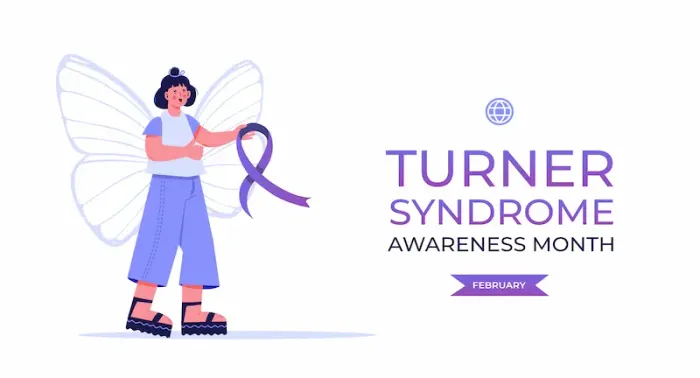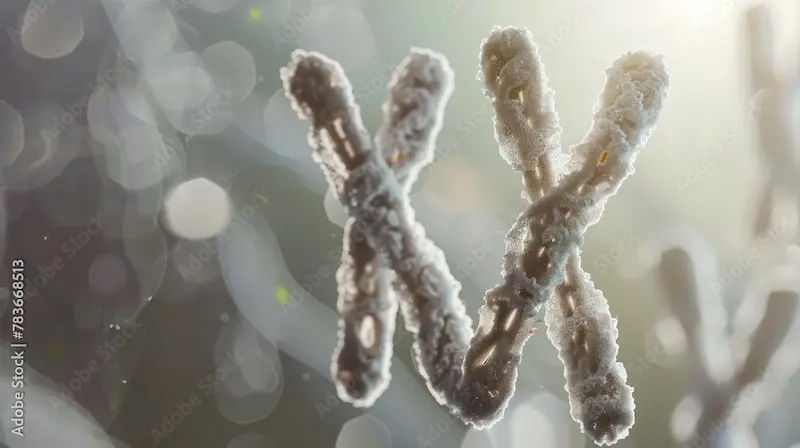Recognising the Signs of Turner Syndrome: A Comprehensive Guide
Learn how to recognise the signs of Turner syndrome across all life stages. From subtle early indicators to adulthood health concerns, this guide explains symptoms, diagnosis, and management.

Written by Dr. J T Hema Pratima
Reviewed by Dr. Rohinipriyanka Pondugula MBBS
Last updated on 13th Jan, 2026

Introduction
Turner syndrome is a genetic condition that affects approximately 1 in every 2,500 female births, making it a significant but often overlooked health topic. Unlike many disorders, its signs can be subtle at birth and become more pronounced with age, leading to delayed diagnosis and anxiety for families. This guide aims to demystify Turner syndrome by providing a clear, compassionate, and comprehensive overview of its signs and symptoms across all stages of life. Whether you're a parent concerned about your daughter's development, a teenager navigating health questions, or simply seeking to understand this condition, we will walk you through the key indicators, from the common hallmark of short stature to the more complex health considerations. Recognising these signs early is the first crucial step towards effective management and support, empowering individuals with Turner syndrome to lead full and healthy lives.
What Exactly is Turner Syndrome?
Turner syndrome (TS) is not an illness but a genetic condition that occurs when one of the two X chromosomes in a female is either completely or partially missing. This chromosomal variation affects development and can cause a variety of medical and developmental challenges. It's important to understand that TS is a random genetic event and not caused by anything the parents did or did not do.
The Genetic Cause: Understanding the X Chromosome
Typically, females are born with two X chromosomes (XX). In Turner syndrome, one of these chromosomes is missing, partially missing, or altered. The most common form is monosomy X, where each cell has only one complete X chromosome. Other variants include mosaicism, where some cells have two X chromosomes and others have one, which can sometimes lead to milder symptoms. This chromosomal difference disrupts typical female development, influencing height, sexual development, and the function of various organ systems.
Early Signs and Symptoms in Newborns and Infants
For some girls, signs of Turner syndrome are identifiable at birth or during infancy. However, it's crucial to remember that not all babies will show all these features, and some may show none at all.
Physical Characteristics at Birth
Lymphedema: Puffy hands and puffy feet are a classic sign in newborns, caused by a backup of lymph fluid.
Webbed Neck: Extra folds of skin extending from the tops of the shoulders to the sides of the neck.
Low Hairline: A hairline that extends further down the back of the neck.
Broad Chest: A wide chest with widely spaced nipples (sometimes called a "shield chest").
High, Narrow Roof of the Mouth: This can sometimes contribute to feeding difficulties.
Potential Health Concerns in Infancy
Beyond physical traits, some infants may experience specific health issues that prompt further investigation. These can include heart defects, such as a narrowing of the aorta (coarctation of the aorta), or kidney abnormalities. Recurring middle ear infections (otitis media) are also more common in young girls with TS. If your infant shows persistent swelling, feeding problems, or has a heart murmur detected by a paediatrician, a genetic evaluation may be recommended.
Signs Becoming Apparent in Childhood and Adolescence
For many, the signs of Turner syndrome in teenagers and children are what lead to a diagnosis, often when a girl isn't growing as expected or fails to start puberty.
The Most Common Sign: Short Stature
This is arguably the most universal feature. A girl with TS will often have a normal birth size but will show a noticeable slowdown in growth by age 3–5. Without treatment, adults with TS are typically shorter than 5 feet tall. This is one of the primary reasons parents first seek medical advice.
Ovarian Insufficiency and Delayed Puberty
The ovaries typically fail to develop properly (ovarian dysgenesis), which means they don't produce normal levels of oestrogen. This leads to:
A lack of breast development by age 13.
The absence of menstrual periods (primary amenorrhoea).
Infertility in most, but not all, women with TS.
Learning and Social Challenges
While most have normal intelligence, many girls with TS experience specific learning disabilities. These often involve visual-spatial tasks, maths, memory, and attention. They may also struggle with social cues and have difficulty forming peer relationships, which can be a significant source of distress.
Signs and Health Considerations in Adulthood
The management of Turner syndrome is a lifelong process. Women with TS require ongoing monitoring for certain health conditions, including:
Cardiovascular Issues: High blood pressure, aortic dilation, and an increased risk of diabetes.
Thyroid Disorders: A higher prevalence of hypothyroidism (underactive thyroid).
Hearing Loss: Often progressive and can start in early adulthood.
Osteoporosis: Due to low oestrogen levels, bone density can be affected, increasing fracture risk.
Regular check-ups with a doctor who understands Turner syndrome and infertility and other adult health concerns are essential. Consulting a specialist through Apollo24|7 can help you establish a coordinated care plan with endocrinologists, cardiologists, and other necessary experts.
Consult a Endocrinologist for the best advice
How is Turner Syndrome Diagnosed?
If Turner syndrome is suspected based on physical signs or growth patterns, a specific test is required for confirmation.
The Gold Standard Test: Karyotyping
This is a blood test that analyses the chromosomes in a cell. It provides a picture of the chromosomes (a karyotype), allowing doctors to see if one X chromosome is missing or altered. This is the definitive test for diagnosis. Apollo24|7 offers convenient home collection for tests like karyotyping, making the diagnostic process less stressful.
Prenatal Testing and Diagnosis
Turner syndrome can sometimes be identified before birth during routine ultrasounds (showing lymphedema or heart defects) or through prenatal tests like amniocentesis or chorionic villus sampling (CVS), which also perform karyotyping on foetal cells.
Managing Turner Syndrome: Treatment and Support
While there is no cure for the underlying genetic cause, highly effective treatments exist to manage the symptoms.
Growth Hormone and Oestrogen Therapy
Growth Hormone Injections: Started in early childhood, these can significantly increase adult height.
Oestrogen Replacement Therapy: Usually begun at the age of 12–15, this hormone treatment triggers puberty, promotes breast development, and helps maintain healthy bones and tissues.
Monitoring and Treating Associated Conditions
Lifelong, regular screening for heart, thyroid, hearing, and bone health is critical. This may involve echocardiograms, blood pressure checks, hearing tests, and bone density scans.
The Importance of Psychological and Educational Support
Addressing the psychosocial aspects is just as important as medical treatment. Educational support, counselling, and connecting with support groups can dramatically improve quality of life and help individuals build confidence and social skills.
Conclusion and Next Steps
Recognising the diverse signs of Turner syndrome—from the puffy hands of a newborn to the growth concerns of a child and the absent puberty of a teenager—is the first step towards empowerment. This diagnosis, while life-altering, opens the door to a wealth of treatments and support systems designed to address its unique challenges. The journey involves a team: endocrinologists, cardiologists, learning specialists, and most importantly, a supportive family and community.
If you recognise several of these signs in yourself or your child, the most important action is to seek expert guidance. A doctor can provide a proper evaluation and order the necessary tests. For a convenient consultation, you can connect with a geneticist or endocrinologist online through Apollo24|7 to discuss your concerns and plan the next steps. Remember, an early and accurate diagnosis is the key to unlocking a future of health and well-being.
Consult a Endocrinologist for the best advice
Consult a Endocrinologist for the best advice

Dr. Shruthi B
Endocrinologist
20 Years • MBBS,MD ( GEN MED) DM (ENDOCRIONOLOGY)
Bengaluru
Apollo Clinic, JP nagar, Bengaluru

Dr. Chaithanya R
Internal Medicine Specialist Diabetologist
16 Years • MBBS, MD Internal Medicine, Fellowship in Diabetes(UK), CCEBDM(PHFI)
Bangalore
Apollo Clinic Bellandur, Bangalore
(75+ Patients)

Dr. E Prabhakar Sastry
General Physician/ Internal Medicine Specialist
40 Years • MD(Internal Medicine)
Manikonda Jagir
Apollo Clinic, Manikonda, Manikonda Jagir
(150+ Patients)
Aditya Singh
Endocrinologist
8 Years • MBBS
Bengaluru
Apollo One Electronic City, Bengaluru

Dr. Anjali Sathya
Endocrinologist
20 Years • MBBS, MD, DNB(Gen Med), DNB (Endo)
Chennai
Apollo Speciality Hospitals Vanagaram, Chennai
(200+ Patients)
More articles from Turner Syndrome
Frequently Asked Questions
1. Can Turner syndrome be detected during pregnancy?
Yes, it can be. Signs like a large fluid collection at the back of the neck (nuchal translucency) on an ultrasound may suggest TS. Definitive prenatal diagnosis requires an invasive test like amniocentesis or CVS to perform a karyotype on the foetus.
2. Are women with Turner syndrome always infertile?
While ovarian failure and infertility are very common, affecting about 95% of women, it is not absolute. A small percentage may have spontaneous puberty and even become pregnant naturally. For most, however, achieving pregnancy requires assisted reproductive technologies, most often using donor eggs.
3. What is the life expectancy for someone with Turner syndrome?
With modern medical care and consistent monitoring for associated health conditions like heart disease, life expectancy is near normal. Regular healthcare is essential to manage risks proactively.
4. Is Turner syndrome inherited?
In the vast majority of cases, no. It is a random error during the formation of reproductive cells in a parent. There is no increased risk of having another child with TS for the same parents.
5. Does Turner syndrome affect intelligence?
No, Turner syndrome does not cause intellectual disability. Most individuals have normal intelligence. However, many experience specific learning disabilities, particularly with maths, spatial reasoning, and memory, which require targeted educational support.

